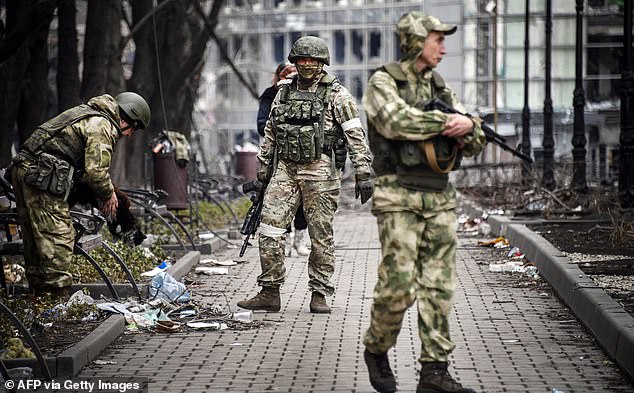At least a dozen Russian soldiers have reportedly died and 30 others hospitalised after eating watermelons poisoned by Ukrainian resistance fighters in an occupied town.
Putin’s troops stationed in the Russian-occupied city of Mariupol received the melons from unwitting Russian locals, who received them from partisan groups in the city, according to local media reports.
Ukrainian media outlet 24 Kanal claimed the watermelons had been handed over to local resistance fighters, who passed them on to the Russians, who then sold them to Russian soldiers.
Following the deaths, a Ukrainian resistance group posted: “This is for you guys! Thank you for protecting us.”
“The resistance movement is actively fighting,” said Pyotr Andryushchenko, an adviser to exiled Mariupol mayor Vadym Boychenko.
File image of Russian soldiers walking on a street in Mariupol on April 12, 2022
He added that the Russians who had moved into the occupied territories had been hired to deliver the poisoned fruit.
He said: ‘Our people (Ukrainians) do not take direct part in delivering such dangerous ‘gifts’ to the Russians.
‘There are always people who come in droves from Russia and want to make money, that is, they want to trade something.
‘The operation was simple. It was clear that they were buying watermelons for a military base.
“It was clear who was going to supply these watermelons. These people were sold a batch of watermelons at a low price, which then caused the intended damage.”
Mariupol was captured after a three-month battle following Moscow’s attack on Ukraine in 2022.
Since then, the city has been left in ruins, with pockets of resistance carrying out small acts of sabotage.
Last year, two dozen Russian soldiers were reported to have died after drinking poisoned vodka supplied by another resistance group in neighbouring occupied Crimea.
The group calling itself the Crimean Fighting Seagulls posted on its Telegram channel that it had killed 24 Russian soldiers.
He added that he had hospitalised another 11 people after giving them poisoned food and drinks in Simferopol, Crimea’s second-largest city.
The group also boasted of tricking dozens of Russian troops into accepting “gifts” laced with arsenic and strychnine at a military checkpoint from “nice girls.”


